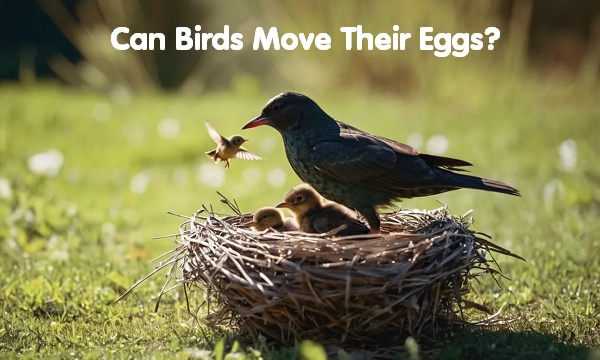When it comes to birds, one of the most common questions people ask is, “Can birds move their eggs?” After all, we know that birds are highly protective of their nests and eggs. So, could they ever relocate them? Let’s dive into this topic and explore the fascinating details of how birds handle their eggs, why they don’t typically move them, and the rare exceptions where they do.
Do Birds Move Their Eggs?
For most bird species, the answer is simple: No, they don’t move their eggs. Once a bird lays its eggs, it typically stays put in the nest to incubate and protect them until they hatch.
Birds are instinctively protective of their eggs and nests, but once the eggs are laid, the nesting behavior tends to follow a strict pattern. This is especially true for ground-nesting birds like ducks and plovers, who rely on their nests to keep their eggs safe from predators.
However, there are a few exceptions. Let’s explore how and why some birds might move their eggs — and how rare this behavior is.
Why Do Most Birds Not Move Their Eggs?
Birds are creatures of habit and instinct. Once they lay their eggs, their focus shifts to incubating them until they hatch. Nesting birds, like robins, sparrows, and eagles, generally build their nests in places that offer protection from weather and predators. They usually don’t need to move the eggs after laying them. But the reason they don’t move them goes beyond laziness—it’s about survival instincts.
- Protection and Security
Eggs are fragile, and moving them could expose them to unnecessary risks. Birds instinctively know that if they move their eggs, they might expose them to predators or environmental stress. It’s much safer to leave them in a protected nest where the parent can guard them. - Energy and Focus
Incubating eggs requires a lot of energy and concentration. Birds have to keep their eggs warm and safe from the elements, so moving them would be inefficient and potentially harmful. The parent bird’s job is to stay put and protect the nest, not relocate eggs around.
Can Some Birds Move Their Eggs?
Now, here’s where things get interesting. Some species of birds do move their eggs, but it’s extremely rare. For most birds, once the eggs are laid, they’re not going anywhere. But certain situations can force birds to relocate their eggs.
1. Brood Parasitism – Cuckoos’ Sneaky Egg Strategy
One of the most well-known examples of egg movement in the bird world comes from brood parasitic birds, like cuckoos. Cuckoos lay their eggs in the nests of other birds, effectively tricking the host bird into incubating and raising the cuckoo chick as their own.
The cuckoo doesn’t move the eggs of other species, but it does move its own eggs into the nests of other birds. This is a survival strategy that saves the cuckoo time and energy while ensuring the survival of its offspring.
2. Ravens and Crows – Rare Egg Relocation
Some birds, like ravens and crows, have been observed to move their eggs under specific circumstances. These birds are known for their intelligence, and they may relocate their eggs within their nests or even move them to different nests if they sense danger or disruption. This could be a defensive measure to protect their eggs from predators or disturbances.
3. Waterfowl – The Abandonment and Relocation Strategy
In certain cases, waterfowl (ducks, geese) may abandon their nests if disturbed, but they rarely physically move their eggs once laid. However, if their nests are threatened or if they need to relocate to a safer area, they might leave the eggs behind. Sometimes, they may build a new nest in a safer location, but they do not relocate eggs that have already been laid.
How Do Birds Move Their Eggs?
For those species that do engage in egg movement, the method is typically pretty straightforward. Birds may use their beak or talons to gently pick up their eggs and move them. For example:
- Crows and ravens may carefully transport their eggs within their nests by using their beaks.
- Ground-nesting birds might move eggs from one area of the nest to another if they feel the eggs are at risk from predators or the environment.
This process requires a high level of precision, as eggs are fragile and easily damaged. This is one reason why egg movement is so rare.
Why Do Birds Move Their Eggs in Certain Cases?
There are a few reasons why some birds might move their eggs, despite the usual instinct to leave them untouched:
- Predator Protection
The most common reason is to protect the eggs from predators. If a bird senses that a predator is near, it may attempt to relocate its eggs to a safer part of the nest or even to a new nest entirely. This behavior is particularly seen in intelligent birds like ravens, which can recognize threats. - Environmental Changes
Changes in weather, such as heavy rain or temperature fluctuations, can lead some birds to move their eggs. For instance, seabirds and cliff-nesting birds may abandon nests due to rising sea levels or changing winds, and they might look for a new spot for their eggs. - Disrupted Nests
In some rare cases, if a nest is disturbed (e.g., by humans or other animals), birds may feel the need to relocate their eggs to protect them from further disruption.
Conclusion: Can Birds Move Their Eggs?
While most birds don’t move their eggs once they’ve been laid, there are a few species that do engage in egg relocation behaviors. Cuckoos, crows, and ravens are some of the exceptions to the rule, often moving eggs to protect them or ensure the survival of their offspring.
Understanding the nesting and egg-laying behaviors of birds is key to appreciating how they survive in the wild. Birds have evolved unique and sometimes unexpected strategies to protect and nurture their young, and while moving eggs is rare, it’s just one of the many fascinating adaptations these creatures exhibit.
Frequently Asked Questions
Can a bird move its eggs if they are disturbed?
In most cases, no. Birds do not typically move their eggs once laid. However, some species may abandon or relocate eggs if their nests are disturbed or if they sense danger.
Why do cuckoos lay their eggs in other birds’ nests?
Cuckoos are brood parasites. Instead of raising their own eggs, they lay them in other birds’ nests to avoid the energy and risk of incubation and chick-rearing. The host bird raises the cuckoo’s chick as its own.
Do all birds lay their eggs in nests?
No. While most birds do lay their eggs in nests, some species, like the common murre, lay their eggs directly on rocky surfaces or cliffs.





Add comment